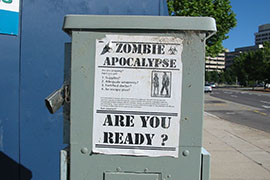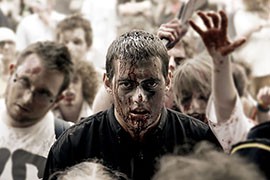Cronkite News has moved to a new home at cronkitenews.azpbs.org. Use this site to search archives from 2011 to May 2015. You can search the new site for current stories.
Shuffle elsewhere: Arizona does well on zombie attack survivability
WASHINGTON – Arizona has been known to lure new residents with its favorable climate and low taxes, but three new studies may give the state a fresh appeal: zombie apocalypse survivability.
Travel site Hopper and real estate search firm Estately recently ranked Arizona as a good place to be in the event of a zombie outbreak, while online real estate firm Trulia took the other tack, ranking the state as less zombie-friendly than others.
In both scenarios, Arizona came out as good for those with a heartbeat.
The rankings – based on such things as good-for-zombies obesity ratings and traffic tie-ups and good-for-humans gun ownership and hardware stores – are the latest in the offbeat “best of” lists that pop up regularly from companies seeking a little buzz.
And Halloween seemed to get several thinking of zombies.
“It’s a fun way to entertain people and get some brand recognition,” said Estately’s Ryan Nickum, who said the zombie listing got a “pretty substantial” reaction on Facebook.
It’s not the first time such lists have been used to attract attention. Estately, for example, has published lists of the states with the most-immature men and each state’s most-popular cocktail.
Trulia got in to the spirit of the season with a survey on prospective homebuyers’ feelings on haunted houses, but it has also put out lists of cities where homeownership was rising fastest. Hopper, a travel site, has listed the best U.S. places to celebrate Cinco de Mayo and the best cities for ribs.
“We do a lot of these sort of best cities, best states for all kinds of different variables,” said Nickum, the lead blogger for Estately who wrote its zombie report.
The reports are typically based on solid data from government or research organizations that is creatively applied – for a zombie apocalypse ranking, for example.
The Trulia and Hopper reports both looked at numbers of hospitals, but where Hopper saw hospitals as a plus for humans, Trulia counted them as a plus for zombies, who would “have quick access to defenseless ‘food’” there.
Hawaii, New York and Washington, D.C., were among the worst places to live, mainly because of traffic congestion that makes it hard to escape and population density – “all-you-can-eat brain buffets, according to Estately. Hopper said a Hawaii outbreak could leave people trapped on a small island with millions of zombies and basically no guns.”
Estately gave extra points to areas where residents had above-average survival skills and zombie knowledge. That was a big plus for Arizona, thanks to the Phoenix-based Department of Zombie Defense.
CEO Shaun Hayes said the Department of Zombie Defense – whose motto is, “If it’s dead, well kill it” – is made up largely of “veterans and former SWAT members – but we’ll take anyone with a heartbeat.”
The group holds regular training exercises at laser tag and paintball arenas, hiring local actors to be zombies. He said what started out as a group where people could learn survival skills and give back to the community, has attracted more than 300 members who learn those skills under the guise of zombie protection.
Hayes says zombies are a metaphor for his group, which hopes to give back to the community. “If you don’t help people, you’re already a zombie,” he said.
Metaphor or not, most people seemed to get into the spirit of the zombie ranking.
Rep. Ann Kirkpatrick, D-Flagstaff, weighed in with an email that said zombies might have a feast in her district, “given all the brains in our universities, STEM (science, technology, engineering and math) cities and research institutions. But they wouldn’t get very far, because zombies are no match for our cowboys.”
Nickum said reaction was mixed.
“Half the people thought it was pretty fun and sort of like a funny, goofy article,” he said. “The other half were kind of riled-up people that were insulted, that thought their state deserved to be higher.”
But talk of the undead sparked a lively discussion – just what the authors intended.
“It seemed like it really connected on a lot of different segments of America – people that are into zombies, people into popular culture and the crowd of people that think Obama is coming for their guns,” Nickum said.
- Cronkite News reporter Miranda Rivers contributed to this report.








